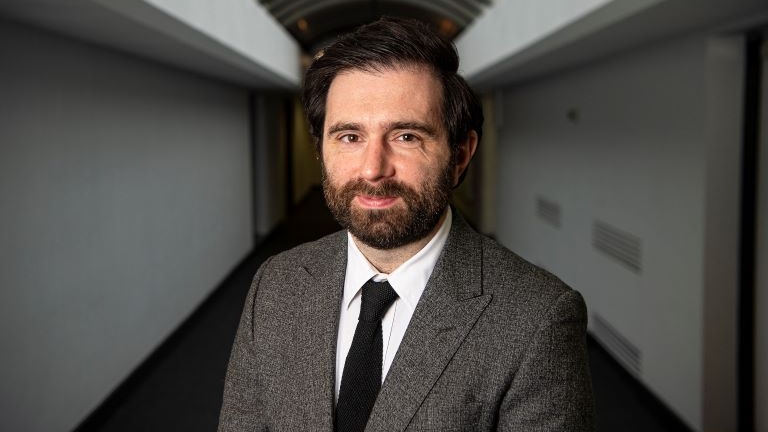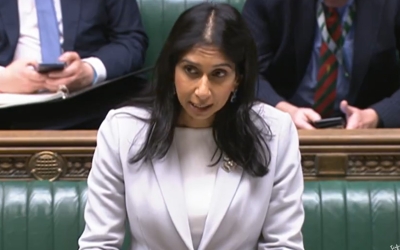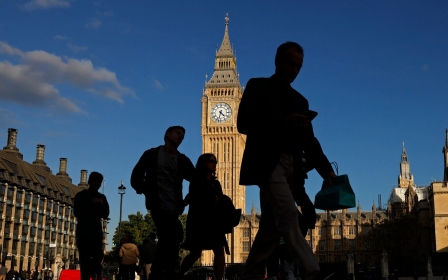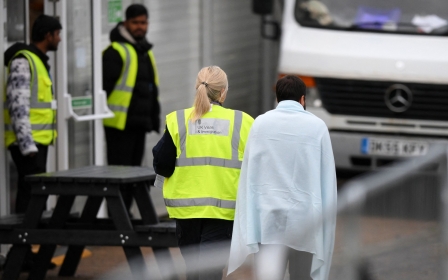Prevent review: Home Office advisor compared Islamophobia to ‘blasphemy law’

The UK government’s contentious review of Prevent continued to face criticism on Thursday, after it was announced that a controversial Home Office-appointed counter-extremism advisor would provide “independent scrutiny” of the department’s response.
Home Secretary Suella Braverman told parliament on Wednesday that she would implement all of the recommendations in William Shawcross’s report, which called for a renewed focus within the counter-extremism strategy on tackling Islamism.
Braverman also said that her department would look to the Commission for Countering Extremism for “independent scrutiny and expertise” in delivering Shawcross’s recommendations.
The Commission for Countering Extremism is currently led by Robin Simcox, whose appointment to the role in 2021 was described by Mend, a Muslim advocacy organisation, as “deeply worrying for Muslim communities”.
Simcox has previously called on the UK government to “push back” against the use of the term “Islamophobia” to describe prejudice and discrimination against Muslims and Islam.
In a 2019 article for the Heritage Foundation, a Washington-based conservative think tank where Simcox was previously a research fellow, he dismissed Islamophobia as a “slippery concept”.
Simcox wrote: “The ambiguity and confusion around the meaning of Islamophobia allows Islamists to use the term to shut down criticism of their religion and impose an informal blasphemy law on the sly.”
What is the Prevent Strategy?
+ Show - HidePrevent is a programme within the British government's counter-terrorism strategy that aims to “safeguard and support those vulnerable to radicalisation, to stop them from becoming terrorists or supporting terrorism”.
It was publicly launched in the aftermath of the 2005 London bombings and was initially targeted squarely at Muslim communities, prompting continuing complaints of discrimination and concerns that the programme was being used to collect intelligence.
In 2011, Prevent's remit was expanded to cover all forms of extremism, defined by the government as “vocal or active opposition to fundamental British values, including democracy, the rule of law, individual liberty and mutual respect and tolerance of different faiths and beliefs.”
In 2015, the government introduced the Prevent Duty which requires public sector workers including doctors, teachers and even nursery staff to have “due regard to the need to prevent people being drawn into terrorism”.
A key element of Prevent is Channel, a programme that offers mentoring and support to people assessed to be at risk of becoming terrorists. Prevent referrals of some young children have proved contentious. 114 children under the age of 15 received Channel support in 2017/18.
Criticism of the Prevent Duty includes that it has had a “chilling effect” on free speech in classrooms and universities, and that it has turned public sector workers into informers who are expected to monitor pupils and patients for “signs of radicalisation”. Some critics have said that it may even be counter-productive.
Advocates argue that it is a form of safeguarding that has been effective in identifying and helping troubled individuals. They point to a growing number of far-right referrals as evidence that it is not discriminatory against Muslims.
In January 2019 the government bowed to pressure and announced that it would commission an independent review of Prevent. This was supposed to be completed by August 2020. After being forced to drop its first appointed reviewer, Lord Carlile, over his past advocacy for Prevent, it conceded that the review would be delayed.
In January 2021 it named William Shawcross as reviewer. Shawcross's appointment was also contentious and prompted many organisations to boycott the review. Further delays followed. Shawcross's review, calling for a renewed focus within Prevent on "the Islamist threat", was finally published in February 2023 - and immediately denounced by critics.
Simcox was formerly a research fellow at the Henry Jackson Society, a neoconservative think tank in the UK previously headed by Shawcross which has been accused of stoking Islamophobia.
Many Muslim advocacy organisations and human rights and civil liberties groups boycotted the Prevent review after Shawcross was chosen to lead it because of remarks he made in a speech as director of the think tank in 2012, in which he said: “Europe and Islam is one of the greatest, most terrifying problems of our future.”
'The best person for the job'
Simcox had welcomed Shawcross’s appointment, writing in the Jewish Chronicle newspaper that the government had “picked the best person for the job”.
In a blog post on the government website on Thursday, Simcox said: “The Independent Review of Prevent’s findings can only aid the quest to keep our country safe from the menaces of extremism and terrorism.
“The Review’s recommendations should prove a significant help to government.
“The CCE is uniquely placed to help scrutinise how the recommendations published in the Independent Review are now implemented and embedded.”
The Commission for Countering Extremism was established in 2017, and commissioners are appointed by the Home Secretary. It says it works with the Home Office but also “operates independently and at arm’s length from government”.
Commenting on Simcox's involvement in implementing the review, Jacob Smith, UK accountability team leader at Rights and Security International (RSI), said the government was "stretching the meaning of independence beyond the point of absurdity".
Smith told MEE: "The government does not appear to know what independence means. Rather than appointing someone through an extensive and transparent recruitment process, yet again they’ve chosen to hire someone that already works for them, with civil servants to help."
RSI has previously questioned the independence of the Prevent review and threatened legal action against the Home Office.
Layla Aitlhadj, director of Prevent Watch, an advocacy organisation supporting people affected by the programme, told MEE: “It seems the word independent has lost all meaning.”
“We are witnessing the managed implementation of a failed, discriminatory policy by people connected to the controversial Henry Jackson Society. This continues to raise questions about state-facilitated Islamophobia and democratic subversion."
Shawcross’s review has been widely rejected by Muslim community groups and human rights organisations.
The Muslim Council of Britain said the review would “make Britain less safe and will make British Muslims feel particularly vulnerable”.
Ilyas Nagdee, Amnesty International UK’s racial justice director, said the review was “riddled with biased thinking, errors, and plain anti-Muslim prejudice”.
He added: “There is growing evidence that Prevent is having disastrous consequences for many people; eroding freedom of expression, clamping down on activism, creating a compliant generation and impacting on individual rights enshrined in law.
Ruth Ehrlich, head of policy and campaigns at Liberty, said the government’s acceptance of Shawcross’s recommendations showed it was “not committed to engaging meaningfully with Muslim communities but instead targeting them further”.
Middle East Eye propose une couverture et une analyse indépendantes et incomparables du Moyen-Orient, de l’Afrique du Nord et d’autres régions du monde. Pour en savoir plus sur la reprise de ce contenu et les frais qui s’appliquent, veuillez remplir ce formulaire [en anglais]. Pour en savoir plus sur MEE, cliquez ici [en anglais].






